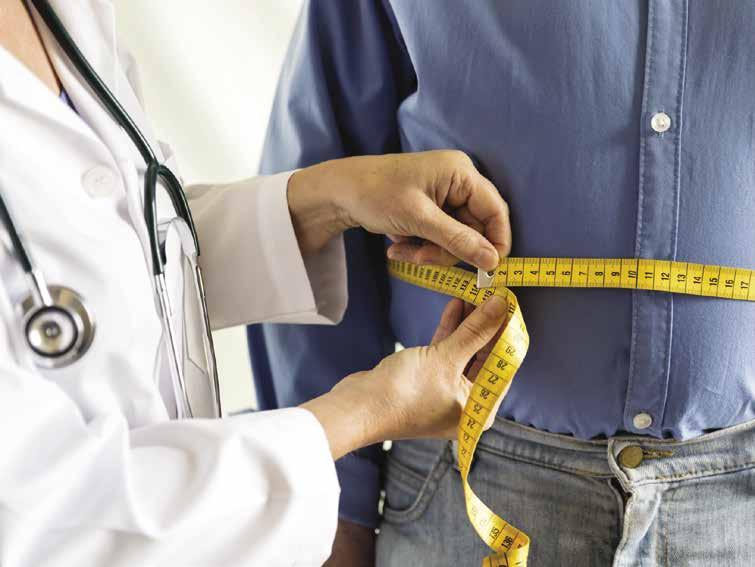
4 minute read
Unlocking the Mysteries Surrounding Bariatric Surgery
Bariatric surgery is so effective that beyond treating obesity, it also can cure or significantly improve diabetes, heart disease, high blood pressure, arthritis, and acid reflux – sometimes almost immediately after surgery.
Advertisement
In 2019, Pennington Biomedical recruited Dr. Phil Schauer from the Cleveland Clinic to develop a destination bariatric surgery and obesity treatment program in partnership with Our Lady of the Lake Regional Medical Center. Today, the Metamor Institute reflects the efforts of Pennington Biomedical, Our Lady of the Lake Regional Medical Center, the Office of the Governor of Louisiana, Louisiana Economic Development (LED), and the LSU School of Medicine in New Orleans.
Dr. Schauer has performed over 8,000 bariatric surgeries. He has authored more than 400 scientific papers, 60 textbook chapters and three textbooks on obesity and bariatric, metabolic and gastrointestinal surgery. His research has appeared in the New England Journal of Medicine, JAMA, Lancet and other noted journals. His 35,000+ research citations and awards include recognition from the Wall Street Journal and the Cleveland Clinic, which presented him with the 2015 Sones Award, its highest honor for scientific innovation. Dr. Schauer holds four patents for medical devices. He has trained more than 100 surgical fellows. He revolutionized bariatric surgery at the University of Pittsburgh by contributing to the development of a laparoscopic approach to bariatric surgery.
And yet, even Dr. Schauer who has also spent years in the laboratory testing various mechanisms of surgery does not understand how this one surgery can have such profound health effects. “We know it works, but the reasons why are not clear,” Dr. Schauer said.
In an effort to better understand exactly how and why surgery cures or ameliorates so many diseases, Pennington Biomedical recruited Dr. Vance L. Albaugh, a metabolic surgeon and scientist. Dr. Albaugh brings a unique perspective as a formally-trained scientist and clinical surgeon who is fully immersed in both the clinical and research settings.
“The fact that bariatric surgery has such powerful physiologic effects that we don’t understand just proves how complex obesity really is,” he said. “Just hours after surgery, many patients experience changes in their perception of hunger and taste. We routinely see dramatic improvements in blood sugar even before significant weight loss, implying that there is something specific to surgery driving these changes that can’t be duplicated with even the lowest calorie or medical-supervised diets. These changes observed following metabolic surgery give people almost ‘super-human abilities’ to change their food intake and reduce calorie intake better than any other dietary, behavioral or medical intervention available. I want to explore these phenomena, which have been largely ignored by many in the medical community. Once we understand exactly why surgery is so effective, we can potentially create new treatments to mimic the effect of bariatric surgery without the actual surgery,” he said.
“Many people think surgery works because surgeons make the stomach smaller which prevents people from eating too much,” he added. “But we know definitively that is not the case. For example, when someone loses even 30 or 40 pounds with diet or exercise, that

Philip R. Schauer, MD
United Companies Life Insurance Co./ Mary Kay and Terrell Brown Chair; Professor, Clinical Metabolic Surgery Lab

Vance L. Albaugh, MD, PhD
Assistant Professor of Metabolic Surgery, Metabolic Surgery Lab
person typically fails to maintain long-term weight loss because their body is continually fighting to regain that lost weight. People experience intense hunger, food cravings and metabolic changes that lead to eventual weight regain. Anyone who has lost a significant amount of weight with diet/exercise understands this very well. Amazingly, surgical patients lose literally hundreds of pounds and don’t experience those same changes in hunger or food cravings. It’s almost like surgery has somehow re-programmed the body weight that the brain is trying to maintain.”
Dr. Albaugh explains that the gastrointestinal tract is a major regulator of metabolism and body weight regulation. Metabolic surgery changes numerous facets of intestinal physiology that drive weight loss and increase satiety. “I believe the intestinal tract is overlooked,” he said.
“Nearly everywhere else, the focus (on bariatric surgery) is on the clinical aspect of surgery and research into the mechanisms driving weight loss is not a priority. I am so grateful for the opportunity to build a bariatric surgery research program aiming to address these profound effects,” he added. “It can be incredibly difficult for a surgeon to get funding for research in the typical academic medical center, and for that I am incredibly grateful for those individuals who realized the importance of this focus and paved the way for me to come here.”
“This exciting new endeavor for Pennington Biomedical was made possible due to generous champions of a vision. Two couples in particular energized its creation and related treatment and research priorities,” said Rebecca Schutte, President and CEO of Pennington Biomedical Research Foundation. “Gary and Claudia Phillips appreciated the vision and direction very early on and made this all possible with significant and early investments. Charlie and Carole Lamar, longtime supporters and strong advocates for Pennington Biomedical, also understood what the Metamor Institute could become and supported these efforts in a meaningful way. Philanthropy will continue to drive growth of the Metamor Institute’s research program.” •







